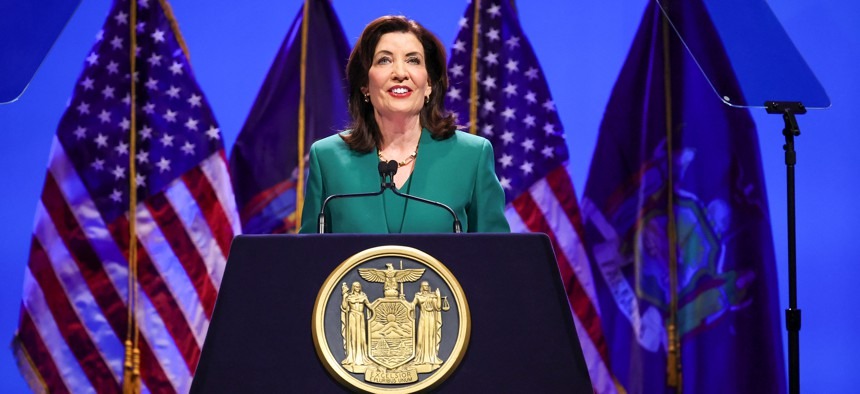Governor Hochul’s 2025 State of the State Address, while addressing items such as affordability and public safety, disappointingly ignored one of the most critical issues facing New York: the ongoing crisis of government transparency.
When Hochul took office in 2021, she promised a new era of openness and accountability. Four years later, these promises remain largely unfulfilled. New York’s open government laws, including the Freedom of Information Law (FOIL) and Open Meetings Law (OML), continue to be abused and ignored without consequence. This failure undermines the very foundation of democracy: the public’s right to know.
No government entity in New York State tracks compliance with transparency laws. Research conducted by volunteers from the New York Coalition for Open Government reveals the scale of this crisis:
- 72% of towns do not post meeting documents online
- 25% of towns do not post meeting minutes or a recording
- 39% of counties fail to acknowledge a FOIL request within five business days as required by law
- 75% of Planning Boards do not post meeting documents online
- Only 25% of villages post meeting minutes online
- 35% of villages do not post a meeting agenda
- Out of 158 school district executive session motions reviewed, 61% are not in compliance with the Open Meetings Law
These violations are not just technicalities—they erode public trust and deny New Yorkers the information they need to hold their government accountable. Even New York State’s own Committee on Open Government (COOG) acknowledges this in its 2024 report to the governor, citing continued frustration from citizens over systemic non-compliance.
Yet, Hochul’s administration has failed to act. No new funding has been allocated, no enforcement mechanisms have been strengthened, and no response has been given to our organization’s repeated calls for reform.
So, what did the governor do in 2024?
First, she vetoed a bill— for the second time—that would have required posting online summaries of state contracts exempt from comptroller review. This bill sought to enhance transparency in state spending, especially for costly emergency contracts during crises like the COVID-19 pandemic and the migrant influx. State Comptroller Thomas DiNapoli called the move “very disappointing” and remarked that “without public disclosure of how taxpayer money is being used, it raises questions about whether the public is getting the best value for its money.”
Second, she signed a bill mandating that agencies notify employees when their disciplinary records are disclosed under the Freedom of Information Law (FOIL). This undermines the progress made by the 2020 repeal of 50-a, a pivotal police accountability law.
Hochul’s recent signing of a law requiring municipalities to maintain and regularly update an official webpage is a step in the right direction. However, this mandate remains unfunded.
New York was the last state in the country to pass an open meetings law, and its current transparency framework remains among the weakest. Unlike other states, New York lacks an independent body with the authority to enforce open government laws. Instead, individuals are forced to navigate costly and complex legal battles to address violations. There is still no legislation that mandates that the public has the right to address their elected officials at public meetings.
The New York Coalition for Open Government has advocated for and introduced several important bills in Albany, which will improve government transparency and accountability.
1) Constitutional Amendment (NYA00834)
New York’s Constitution does not explicitly guarantee the right to open government—and it should.
Four states—California, Florida, Louisiana, and Montana—have enshrined the right to open government in their constitutions. In recent years, New York has passed constitutional amendments addressing critical issues such as environmental protections and equal rights. It’s time for the state to do the same for the fundamental right to open government.
The bill proposes adding the following language to New York’s Constitution:
“The right to public information, being a necessary and vital part of democracy and public deliberation, shall be a fundamental right of the people. The right of the people to inspect and/or copy records of government, and to be provided notice of and attend public meetings of government, shall not be unreasonably restricted.”
Across the country, state legislatures are seeking to weaken the public’s right to information. New York must take proactive steps to protect and strengthen transparency to ensure such rights are never undermined in our state.
2) Mandatory Attorney Fees (A00950/NYS01418)
Winning a Freedom of Information Law (FOIL) or Open Meetings lawsuit doesn’t automatically guarantee reimbursement for attorney fees in New York—and our bill aims to address this challenge.
New York’s current attorney fee statute is weaker than those in many other states, making it more difficult to recover legal fees, even after a successful lawsuit. In states like California, Colorado, Delaware, Florida, Illinois, Louisiana, Michigan, Montana, New Jersey, Rhode Island, and Washington, attorney fees are awarded when a party “prevails” in a lawsuit. By comparison, New York’s statute requires a party to “substantially prevail,” a higher standard that places an additional burden on plaintiffs.
Even after a plaintiff wins an Article 78 action—a legal process often used to challenge decisions made by state or local agencies—a secondary legal battle often arises to determine whether the plaintiff “substantially prevailed” and qualifies for attorney fees. New York law further complicates matters by requiring courts to find that the agency lacked a reasonable basis for denying the FOIL request. This extra hurdle is not required in the other states mentioned.
Under the Open Meetings Law, attorney fees cannot be awarded if an agency believed it had a reasonable basis for holding an improper executive session. However, when a court rules that an executive session was improperly held, it stands to reason that a successful plaintiff should be reimbursed for their attorney fees—regardless of whether the agency’s actions were deemed “reasonable.”
Our proposed bill seeks to eliminate these unnecessary barriers and align New York with best practices in other states. It ensures that citizens who fight for transparency are not discouraged by the prospect of unreimbursed legal costs, creating a fairer and more accessible path to open government.
3) Create A Hearing Officer System To Address Freedom of Information Law Appeals And Open Meetings Law Complaints (Assemblymember Rosenthal A7933)
When Open Meetings Law violations are ignored or denied in New York, the public’s only option is to file a lawsuit. To address this enforcement gap, we have proposed a bill to create a system of independent hearing officers to handle these cases.
Currently, no entity enforces New York’s Open Meetings Law. Unlike other states, New York lacks an independent body with the authority to address violations of open government laws such as the Open Meetings Law and the Freedom of Information Law (FOIL). While other states impose fines or criminal penalties for violations, New York offers no such recourse. Instead, citizens must hire attorneys to file an Article 78 proceeding, with no guarantee of reimbursement for legal fees.
A Proven Model for Reform
In the 1980s, New York homeowners faced similar challenges when addressing rising property taxes. Their only recourse was to file costly lawsuits in Supreme Court. To alleviate this burden, the state legislature created the Small Claims Assessment Review (SCAR) system in 1982.
Under SCAR, homeowners complete a simple application, pay a $30 filing fee, and have their cases reviewed by hearing officers appointed by the New York State Office of Court Administration. These officers, who are professionals with expertise in property valuation, provide an affordable and accessible process. In 2020 alone, the system handled 102,000 assessment complaints statewide.
Expanding the Model to Open Government Laws
We propose adapting the SCAR model to handle FOIL and Open Meetings Law appeals. Under this system, individuals would pay a small filing fee to have their cases reviewed by independent hearing officers with expertise in open government laws. This approach would offer faster, fairer resolutions while ensuring accessibility for all New Yorkers.
4) Mandate Public Comment Sessions At All Meetings (under development)
Many people are shocked to learn that, in New York State, they do not have a guaranteed right to speak at town board, city council, or county legislature meetings. Several municipalities do not allow the public to speak at regular meetings of their elected bodies at all. The right to be heard—a fundamental democratic principle—should be required by law.
Currently, New York’s Open Meetings Law does not mandate public comment periods at government meetings. While many local governments do provide an opportunity for the public to speak, not all do. This inconsistency leaves many citizens without a voice in decisions that directly affect their lives.
In a recent report by the New York Coalition for Open Government, it was revealed that 177 towns across the state do not allow public comments during their meetings. This lack of transparency and engagement undermines public trust and democratic participation.
Thirteen states already mandate public comment periods at government meetings, including Alaska, Arkansas, California, Hawaii, Louisiana, Montana, Nebraska, Nevada, New Jersey, North Carolina, Pennsylvania, Tennessee, and Vermont. New York should join these states in ensuring that the public has the right to speak and be heard.
Democracy thrives when the public is actively engaged, and the right to be heard should never be optional—it should be the law.
5) Require All Local Government Meetings To Be Live Streamed (A00847)
As currently written, New York State’s Open Meetings Law (OML) does not require all public bodies to broadcast their meetings. This omission leaves many New Yorkers—especially older adults, parents, individuals with disabilities, and others—without access to critical discussions and decisions that affect their lives.
While certain state agencies and authorities are required to stream their meetings online “to the extent practicable and within available funds,” this weak requirement lacks consistency and enforcement. As a result, many municipalities that have the ability to stream or broadcast their meetings simply choose not to, further limiting public access to government proceedings.
Ensuring remote access to public meetings is a necessity, not a luxury. It allows those unable to attend in person to stay informed and engaged, and it ensures their voices can still reach their representatives.
More must be done to guarantee that all public bodies in New York provide accessible options for participation, whether through live streaming, broadcasting, or other forms of remote access.
For a deeper dive into this issue, read the Live Streaming Report by the New York Coalition for Open Government.
Conclusion:
We ask Governor Hochul to deliver the transparent government she promised. Transparency should not just be a campaign slogan—it is the bedrock of democracy. It is time to stop ignoring the voices of frustrated citizens and take meaningful action to ensure that government truly operates for the people.
New Yorkers deserve no less.



